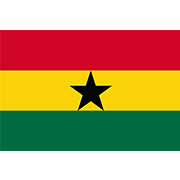Fiscal subject related
- Printed Receipts: These are the traditional hard-copy receipts that can be provided by retailers during fiscal transactions. It's important to note that the use of printed receipts is not compulsory. Retailers have the discretion to opt for digital alternatives if they prefer.
- Electronic Receipts: Also known as digital, soft copy, or e-receipts, these are increasingly common in modern transactions. They can be issued by any taxpayer dealing in goods or services and are typically sent to customers via email or SMS.
In Ghana, the choice of receipt form—whether printed or electronic—is left to the discretion of the taxpayer, providing a level of flexibility that encourages ease of compliance and adaptation to technological advancements. This approach helps cater to diverse consumer preferences and operational styles of businesses and allows for a more modern business setup.
Other news from Ghana
The GRA Pilots Digital Tax System to Capture Ghana’s Growing E-Commerce Sector
 Ghana
Author: Tara Nedeljković
Ghana
Author: Tara Nedeljković
The Ghana Revenue Authority (GRA) is piloting an online revenue system to tax digital and e-commerce businesses, enhancing tax compliance. This effort accompanies a new Modified Taxation Scheme (MTS) for informal sector businesses, simplifying tax procedures. These initiatives aim to modernize Ghana's tax system and improve revenue mobilisation. The Ghana Revenue Authority (GRA) has begun piloting... Read more



Ghana’s Electronic Transactions Bill impact
 Ghana
Author: Tara Nedeljković
Ghana
Author: Tara Nedeljković
In 2025, Ghana's Electronic Transactions Bill was introduced to enhance consumer protection in the online marketplace. It mandates online sellers to display their legal information and refund policies. Consumers can cancel orders within specified periods and receive full refunds. The bill prohibits unsolicited marketing, imposes penalties on offenders, and holds online businesses accountable for s... Read more



The Ghanaian GRA announced simpler VAT rules and further EFD adoption.
 Ghana
Author: Tara Nedeljković
Ghana
Author: Tara Nedeljković
Ghana’s GRA will fully enforce the 2018 Taxation Act on Fiscal Electronic Devices (EFDs) by early 2026, requiring specified taxpayers to use approved devices at every point of sale to ensure accurate transaction reporting and curb underreporting. The reforms will also lower the effective VAT rate from 21.9% to 20% by removing the COVID levy and restructuring other charges, while keeping input VAT fully deductible for businesses. Read more
Subscribe to get access to the latest news, documents, webinars and educations.
Already subscriber? Login


How the process of receipt signing works under current Ghana's fiscalization requirements
 Ghana
Author: Tara Nedeljković
Ghana
Author: Tara Nedeljković
Under Ghana’s E-VAT system, each fiscal receipt must carry a unique electronic signature generated through real-time communication with the Ghana Revenue Authority (GRA). The process involves two steps: transmitting transaction data to receive a sequence number, then requesting and applying a signature key from the GRA to finalize the receipt. Read more
Subscribe to get access to the latest news, documents, webinars and educations.
Already subscriber? Login


How to record returns inside the Ghana fiscalization system?
 Ghana
Author: Tara Nedeljković
Ghana
Author: Tara Nedeljković
These return documents are generated through certified invoicing systems, include all key details (like receipt numbers and QR codes), and ensure compliance with Ghana Revenue Authority (GRA) rules. The system supports both online and offline modes, allowing provisional QR code issuance during outages, with automatic tax calculation and real-time updates to the GRA. In Ghana, handling retu... Read more



TLv6 Implementation Marks Significant Shift in EU’s Trust List Format
A new EU Trust List format, TLv6, will officially replace TLv5 in May 2025 as part of the updated eIDAS Regulation (EU 2024/1183). It introduces key technical changes like a new URI field, updated signature format, and optional phone number support. Organizations must update their systems to avoid signature validation failures and service disruptions, as TLv5 will no longer be valid once TLv6 take... Read more



New document was uploaded: Recorded webinar: E-invoicing for Global Retailers
If you are struggling with complex e-invoicing implementations across multiple countries, and if you are concerned about mounting costs, potential delays, or compliance risks, our webinar will help you to learn how global retailers can streamline e-invoicing efficiently! With countries worldwide mandating e-invoicing, international retailers face unique challenges adapting to new regulations acros... Read more


